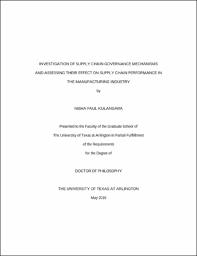
ATTENTION: The works hosted here are being migrated to a new repository that will consolidate resources, improve discoverability, and better show UTA's research impact on the global community. We will update authors as the migration progresses. Please see MavMatrix for more information.
Show simple item record
| dc.contributor.advisor | Prater, Edmund | |
| dc.contributor.advisor | Frazier, Gregory | |
| dc.creator | Kulangara, Nisha Paul | |
| dc.date.accessioned | 2018-02-01T15:42:06Z | |
| dc.date.available | 2018-02-01T15:42:06Z | |
| dc.date.created | 2016-05 | |
| dc.date.issued | 2016-05-11 | |
| dc.date.submitted | May 2016 | |
| dc.identifier.uri | http://hdl.handle.net/10106/27140 | |
| dc.description.abstract | With the increasing level of globalization in manufacturing, it is becoming increasingly pertinent to monitor the execution of contractual agreements between buyers and suppliers. These monitoring mechanisms are essential to mitigate risks associated with measurement difficulty, behavioral uncertainty, and environmental uncertainty. Drawing from transaction cost theory and resource dependence theory, this study illustrates frequently applied formal and relational governance mechanisms to ensure a successful supply chain partnership and its effects on various performance measures such as supply chain and innovation performance. Most firms go through three stages of a relationship, namely-contact, contract, and control (Greenberg, Greenberg, and Antonucci, 2012). Once the contact and contract stage of the relationship is established, it is crucial to monitor the execution of these contractual obligations. This monitoring is essential to mitigate risks associated with post-contractual opportunistic behavior. We validated formal and relational mechanisms in the supply chain context to propose effective management of contractual obligations. Given the widening focus on environmental sustainability in manufacturing, this study investigated the mediating effect of environmental regulations on formal and relational governance mechanisms and their impact on environmental performance.
Using a sample of 200 North American manufacturing firms, this study found partial support for the effects of formal and relational mechanisms on performance measures. The findings in this study did not find support for a significant relationship between formal governance and supply chain performance measures of the firms. However, there was partial support for the relationship between formal governance mechanisms and innovative capabilities of firms. The results also suggest partial support for the relationship between relational governance mechanisms and supply chain performance, and innovative capabilities of the firm. Environmental governance mediated the relationship between contingency practices and environmental performance of the firm. Relational norms did not directly impact environmental governance practices. Relational mechanisms like shared values and loyalty improved environmental performance of the firm. This should enable firms to have a better understanding of how suppliers respond differently to formal and informal aspects of a relationship. | |
| dc.format.mimetype | application/pdf | |
| dc.language.iso | en_US | |
| dc.subject | Formal governance | |
| dc.subject | Relational governance | |
| dc.subject | Supply chain governance | |
| dc.title | INVESTIGATION OF SUPPLY CHAIN GOVERNANCE MECHANISMS AND ASSESSING THEIR EFFECT ON SUPPLY CHAIN PERFORMANCE IN THE MANUFACTURING INDUSTRY | |
| dc.type | Thesis | |
| dc.degree.department | Information Systems and Operations Management | |
| dc.degree.name | Doctor of Philosophy in Management Science | |
| dc.date.updated | 2018-02-01T15:44:13Z | |
| thesis.degree.department | Information Systems and Operations Management | |
| thesis.degree.grantor | The University of Texas at Arlington | |
| thesis.degree.level | Doctoral | |
| thesis.degree.name | Doctor of Philosophy in Management Science | |
| dc.type.material | text | |
| dc.creator.orcid | 0000-0002-3992-3510 | |
| local.embargo.terms | 2018-05-01 | |
| local.embargo.lift | 2018-05-01 | |
Files in this item
- Name:
- KULANGARA-DISSERTATION-2016.pdf
- Size:
- 2.130Mb
- Format:
- PDF
This item appears in the following Collection(s)
Show simple item record


